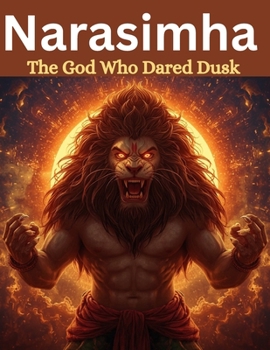Narasimha: The God Who Dared Dusk
Narasimha: The God Who Dared Dusk is a profound exploration of one of the most enigmatic and spiritually charged avatars of the Hindu tradition. Neither fully man nor fully beast, neither of day nor of night, Narasimha emerges at the sacred threshold of existence-where boundaries dissolve and destiny is rewritten. This book invites readers on an immersive journey into the mythological, philosophical, and deeply symbolic world of the lion-man incarnation of Vishnu, offering not merely a retelling of ancient stories but a transformative reflection on the eternal struggle between arrogance and surrender, chaos and order, ego and the soul's highest truth.
Rooted in the rich soil of the Puranas and sacred writings, this narrative unravels the tale of Prahlada-the unwavering devotee-and his tyrannical father, Hiranyakashipu, whose insatiable thirst for power brings the cosmos to the brink of imbalance. In this climactic confrontation, Narasimha descends not simply to destroy a demon but to uphold dharma with a ferocity that embodies both wrath and compassion. The book carefully illuminates how this moment transcends mere myth to become a timeless allegory of the human condition, where pride is shattered and divine grace prevails.
Through evocative prose and profound spiritual inquiry, Narasimha: The God Who Dared Dusk delves into the essence of righteous anger and the mystery of divine timing. The narrative traces the unfolding of cosmic law as gods tremble before Narasimha's uncontainable fury, helpless to intervene, as even deities like Brahma, Shiva, and Lakshmi witness the overwhelming intensity of his protective wrath. The text meditates on the razor's edge where justice and mercy meet, exploring how Narasimha becomes the embodiment of both destruction and salvation.
Beyond the mythic battlefield, the book guides readers into the deeper teachings hidden within the legend. It examines how Narasimha stands as the destroyer of inner tyranny-the relentless ego that enslaves the soul. His form is not only a protector of the devoted but also a mirror reflecting the fiercest battles each seeker must face within. The narrative bridges ancient wisdom with modern psychological struggles, illustrating how the archetype of Narasimha remains deeply relevant in today's world of inner conflicts, anxieties, and spiritual thirst.
Readers will journey through ancient temples, sacred rituals, mantras, and yantras that continue to invoke Narasimha's protection. The book offers an intimate view into the living traditions of devotion that keep his presence vibrant, from the grand stone sanctuaries of the past to the personal altars of seekers today. It explores how diverse schools of thought-Vedanta, Tantra, Yoga-interpret his significance, and how his image has inspired art, dance, literature, and sacred practice for centuries.
Ultimately, Narasimha: The God Who Dared Dusk is not only a study of a divine figure but a contemplative guide for those who seek to awaken courage, surrender ego, and embrace the fierce guardianship of the divine within themselves. It is an invitation to walk the razor's edge between destruction and rebirth, fear and freedom, dusk and dawn.





